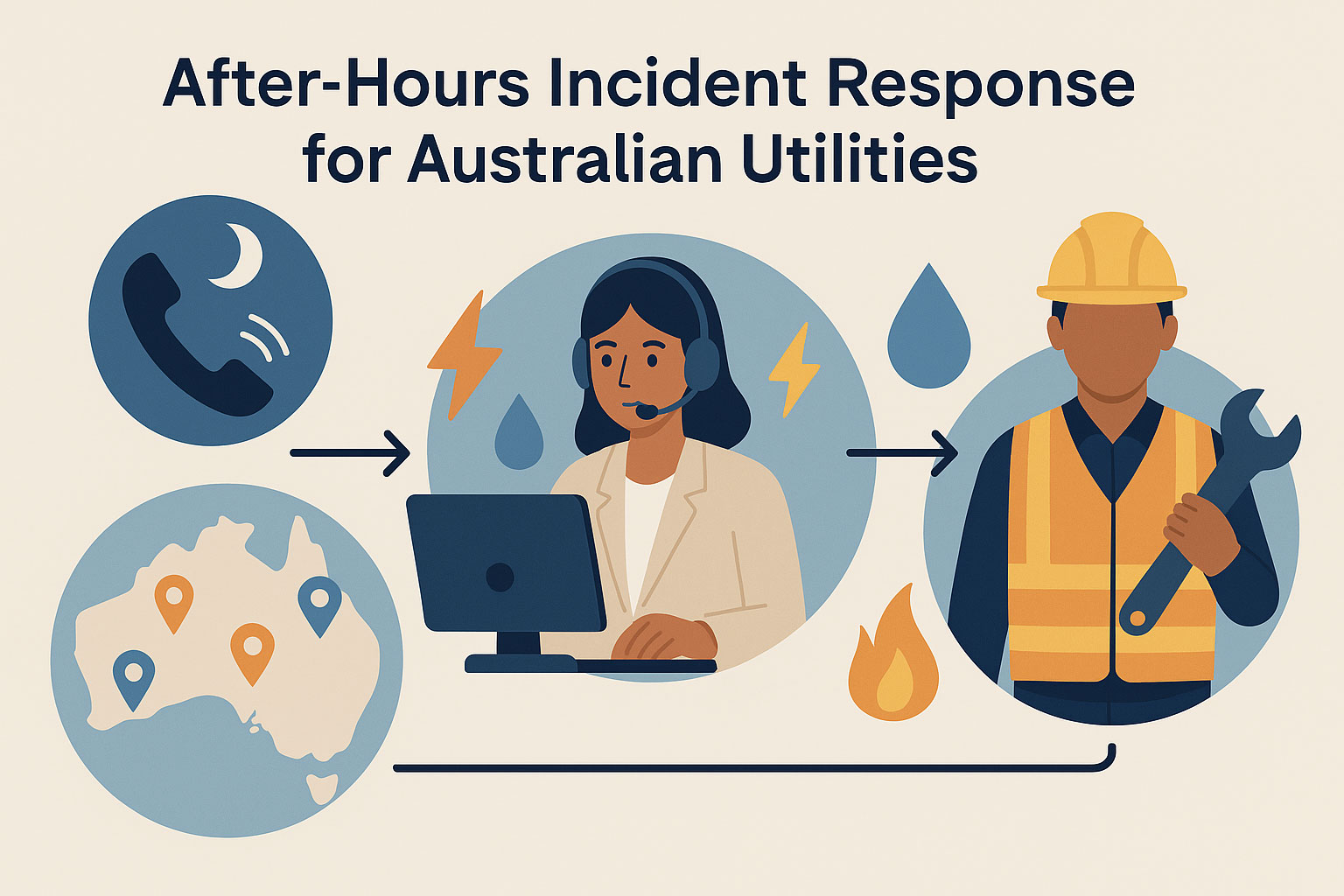
How Answering Services Support After-Hours Incident Response for Australian Utilities
Electricity, gas, and water networks never sleep. Across Australia, utility providers must remain contactable day and night to maintain essential services and protect public safety. Storms, equipment faults, and burst mains can occur at any hour, often outside standard business times when internal staff are unavailable.
That’s where professional phone answering services play a vital role. By managing calls after hours, weekends, and holidays, they ensure that urgent incidents are captured, logged, and escalated without delay. Partnering with a dedicated after-hours phone answering service allows utility companies to deliver round-the-clock coverage without having to maintain costly overnight staffing. It also provides peace of mind to both management and customers that every call will be answered, no matter when an emergency occurs.
Why After-Hours Calls Matter More for Utilities
In the utilities sector, a missed call can quickly become a crisis. When customers report power outages, gas leaks, or water contamination, they expect an immediate human response. If those calls go unanswered, the situation can escalate, resulting in longer downtime, property damage, or even safety risks.
Australian utilities also operate under strict service standards and community expectations. Response time is not just a performance metric, it’s a legal and ethical obligation. Every minute matters in restoring supply or dispatching maintenance teams. By ensuring calls are answered promptly after hours, providers uphold their responsibility to customers while preventing small incidents from becoming large-scale failures.
Common After-Hours Challenges Faced by Utility Providers
Maintaining 24-hour responsiveness presents a unique set of operational challenges. Smaller utilities and regional distributors may not have the resources to staff overnight shifts. During peak events such as heatwaves, bushfires, or severe storms, call volumes can spike beyond what in-house teams can manage.
These situations often lead to:
- Delayed response times due to limited staff availability.
- Missed or misdirected calls during high-pressure periods.
- Difficulty logging incidents when systems are offline or unmonitored.
- Inconsistent communication with customers awaiting updates.
Outsourcing after-hours call management eliminates these weak points. Calls are automatically routed to trained operators who follow the company’s escalation procedures. This not only preserves service continuity but also ensures that customers receive accurate, consistent information when it matters most.
How Professional Answering Services Handle Incident Response
Modern answering services designed for utility providers do much more than take messages. They act as a seamless extension of the operations team.
When an after-hours call arrives, trained operators answer under the utility’s name using pre-approved scripts. They quickly determine the nature of the issue, whether it’s an emergency fault, a billing enquiry, or a general query, and categorise it accordingly. Urgent calls are escalated directly to the on-duty engineer, network controller, or field team, depending on the company’s internal structure.
Each interaction is logged in real time, creating a detailed record for follow-up, compliance audits, or incident reviews. This approach reduces confusion, improves accountability, and guarantees that critical messages never fall through the cracks. The service effectively bridges the gap between customers and field technicians, ensuring that every report reaches the right person at the right time.
Integrating Answering Services with Utility Operations
Today’s answering solutions integrate directly with utility management systems. Whether the provider uses a customer relationship management (CRM) tool, ticketing platform, or a bespoke fault-reporting database, external operators can input data in real time. This gives on-call staff immediate visibility of new incidents without requiring manual follow-up.
Some systems also issue automated SMS or email notifications when a call is logged, helping to coordinate team responses more efficiently. For larger utilities, cloud-based dashboards offer a consolidated view of all active cases, from the initial report to resolution.
Such integration means that external answering teams can perform as if they are part of the internal workforce. They follow the same call scripts, response codes, and escalation hierarchies, keeping communication consistent across every channel. For regional or multi-state utilities, this unified process is essential for maintaining smooth coordination between branches and contractors.
Benefits for Utilities and Their Customers
Outsourcing after-hours incident response delivers tangible benefits to both service providers and end users.
For utilities, the advantages include:
- Reliability: Every call is answered, logged, and prioritised, even during peak times.
- Operational efficiency: Only verified incidents reach on-call staff, preventing false alarms and wasted dispatches.
- Regulatory compliance: Calls are recorded and documented, supporting adherence to safety and reporting standards.
- Cost control: Providers avoid the expense of maintaining in-house overnight rosters.
For customers, the experience is equally important. Speaking with a live operator rather than reaching voicemail offers reassurance that their issue is being addressed. Regular updates, even during large-scale outages, build transparency and trust. When communication remains consistent, customers are more patient and cooperative, reducing stress on field crews and call handlers alike.
Case Example Scenarios
Consider a regional power company managing storm-related outages. During a sudden weather event, thousands of customers lose power overnight. Instead of leaving emergency calls to a skeleton crew, the utility’s after-hours answering team fields incoming reports, logs affected postcodes, and escalates confirmed faults to on-duty engineers. The system filters routine queries from genuine emergencies, helping teams prioritise the most critical cases first.
Or take a water provider that receives a weekend report of a burst main. The answering service operator follows a predefined escalation plan, immediately notifying maintenance staff while recording details for compliance reporting. This swift action reduces water loss, limits property damage, and improves customer confidence.
These examples highlight how well-structured communication can prevent confusion, accelerate response times, and maintain public trust — all without expanding the internal workforce.
Key Takeaways for Utility Managers
After-hours answering services are not just about convenience; they are about resilience. They help Australian utilities maintain service quality, meet safety obligations, and strengthen their connection with the communities they serve.
Utility managers reviewing their current processes should ask:
- How many calls go unanswered outside business hours?
- Are escalation protocols clearly defined and tested?
- Could external call support reduce internal pressure during emergencies?
Addressing these questions before the next storm season can make the difference between a controlled response and a chaotic one. Reliable communication is the backbone of incident management, and professional answering services ensure that link remains unbroken, 24 hours a day.
FAQ’s
Q1: Why do utilities need dedicated after-hours answering services?
A1: After-hours incidents often involve safety or service risks. A professional answering team ensures no customer call is missed and that emergencies are escalated to the right personnel immediately.
Q2: How do answering services escalate emergencies to on-call staff?
A2: Calls are triaged based on urgency. Critical issues are forwarded directly to the on-duty engineer, supervisor, or emergency coordinator according to pre-agreed protocols.
Q3: Can answering services handle large-scale outage situations?
A3: Yes. Services can scale rapidly to manage high call volumes during extreme weather or technical failures, providing detailed logs for incident tracking.
Q4: Are after-hours answering services compliant with Australian regulations?
A4: Reputable providers maintain compliance with privacy and communication standards, including data protection and accurate record-keeping requirements.
Q5: What are the main benefits for customers?
A5: Customers benefit from prompt responses, clear communication, and reassurance that their concerns are taken seriously, even when incidents occur late at night or on weekends.



